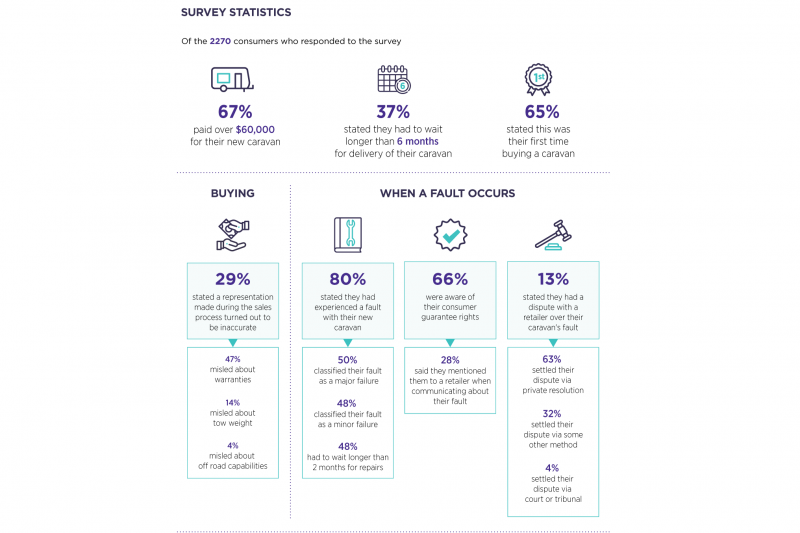The Australian Competition and Consumer Commission (ACCC) is calling for a strengthening of Australian Consumer Law, after a survey of more than 2000 new caravan owners revealed above 80 per cent of respondents had experienced issues.
It said it surveyed 2270 owners, of which 29 per cent said the seller made a misrepresentation during the sales process, including around their consumer guarantee and warranty rights and their caravan’s tow weight.
Of the 80 per cent of owners who experienced problems, 50 per cent classified their fault as a major failure. That’s despite 67 per cent of respondents saying they paid over $60,000 for their new caravan.
The consumer watchdog said it has received 1300 complaints over the past five years from caravan owners.
“A caravan can represent a significant financial and emotional investment. Some people save for years in anticipation of purchasing and travelling in a caravan,” said ACCC deputy chair Delia Rickard.
“If something goes wrong the harm can be significant.
“It is the ACCC’s view that it is reasonable to expect a new caravan won’t develop a major fault within the first several years of use.”
The Caravan Industry Association of Australia said, in response to the ACCC report, that it supports a collaborative approach in addressing issues.
“While the vast majority of industry businesses understand and adhere to their consumer obligations and supplier indemnification responsibilities under the Australian Consumer Law, there always remain opportunities for individual improvement”, said Caravan Industry Association of Australia CEO Stuart Lamont.
“The National body will work closely with industry in assisting them to further understand their obligations in dealing with consumers, and industry businesses along the supply chain, so that consumer expectations are met.”
Under Australian Consumer Law, if you purchase a caravan and it doesn’t meet one or more consumer guarantees, you’re entitled to a remedy from the supplier.
Depending on the severity of the guarantee failure, that can be a repair, replacement or refund – even if the warranty has expired.
But many of the consumers surveyed said they were either unable to obtain a remedy or said remedy didn’t address the issue.
The ACCC also received responses from 67 suppliers, and said 40 per cent of suppliers reported a manufacturer refused to reimburse them for providing a remedy to a consumer – something they’re entitled to receive under Australian Consumer Law.
Retailers are also entitled to receive reimbursement from manufacturers for any parts and labour associated with repairs.
“While a supplier can take legal action against a manufacturer to recover costs, the ACCC’s survey of suppliers found some were reluctant to take this step due to fear of retribution,” Ms Rickard said.
37 per cent of survey respondents also said they had to wait longer than six months for delivery of their caravan, with the caravan industry – like the car industry – affected by COVID-19 supply chain disruptions.
The ACCC also cited increased demand for caravans.
“We expect that suppliers will be upfront with consumers about the timeframe for delivery of their caravan and any potential delays during the sales process and continue to proactively communicate until delivery,” Ms Rickard said.
The ACCC has called for the ACL to be amended to include the tougher rules published by the Treasury in its Consultation Regulatory Impact Statement last December.
These include consideration of fines for actions like:
- Businesses failing to provide a remedy when they’re legally required to do so
- Manufacturers failing to reimburse suppliers
- Retribution by manufacturers against said suppliers seeking reimbursement






